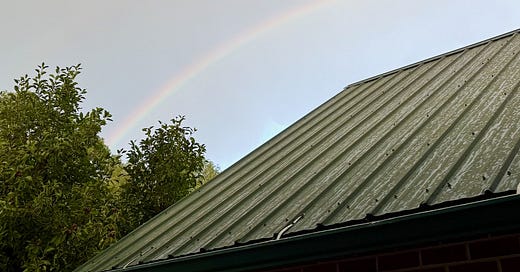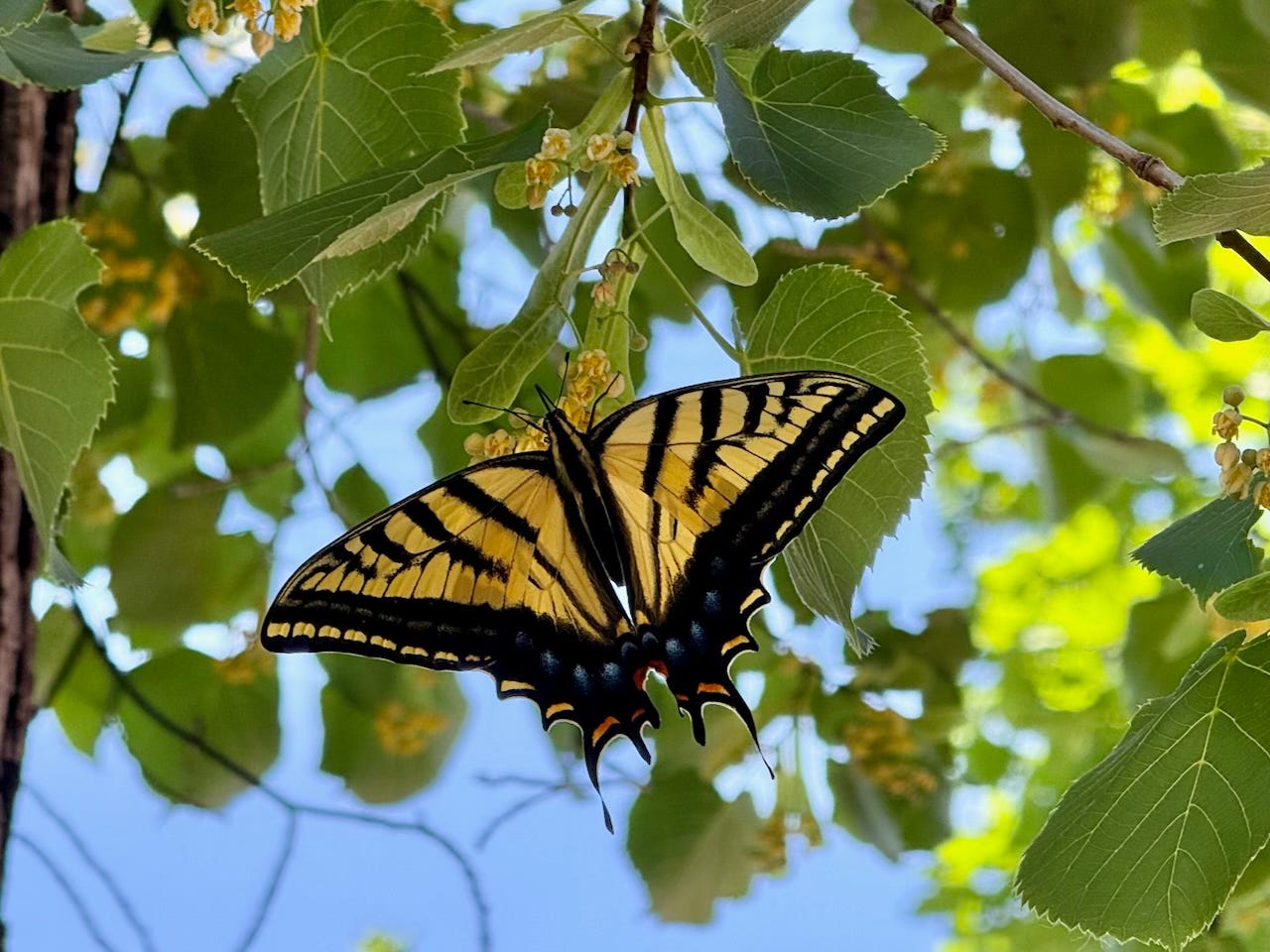Creating a Contemplative Life
Can honoring the sacred in our every day lives heal us and the world?
Hello, Friends,
I woke in the darkness at around 3:00 this morning to strobe-flashes of lightning and the mutter and crash of thunder. Rain! my groggy brain thought, elated at the idea we might be getting moisture at long last.
But there was no pattering on the roof. The light show continued for hours, ending only at sunrise, when a few seconds of rain created the rainbow above, arcing shallowly over my house. Not enough moisture to even wet the ground, just enough to create a moment of beauty.
We so need rain here. That is the weather irony of these times: because of climate change, we bounce between extremes, too much there, too little here. Hence the tragic flash-flooding in various parts of the country in recent days: the Texas Hill Country, the Sacramento Mountains of southern New Mexico, and in various parts of Appalachia.
There, too much rain all at once had brutal consequences, bringing sudden deaths to humans and other beings; here, too little for too long means the deaths are slow and lingering as these landscapes bake in the heat. Our streamflows have dropped to a trickle, irrigation water is drying up for farms and orchards, and a world of hurt is ahead. It’s frightening.
What do drought, floods and climate change have to do with creating contemplative lives? A lot, actually.
What is a contemplative life?
If you look up contemplation in the dictionary, one of the meanings is “deep reflective thought.” Plus, “a form of prayer or meditation where a person seeks… a direct experience of the divine [or, non-theistically, the sacred].”
Living a contemplative life does not mean retreating from the world; it simply means living in a thoughtful way informed by one’s experience of the sacred. It means looking for and honoring the sacred in the every day.
When I started this Substack two autumns ago, the first project I took on was a Year of Spiritual Thinking, an exploration of the spirituality of my Celtic ancestors and my own informal but sustaining daily spiritual practices. (You can read those posts here.) I wanted to examine more deeply why nature inspires my heart and spirit, and where my homegrown spirituality comes from.
What did I learn?
Two important things (The quotes come from this post):
First, for me spirituality is woven through my day and everything I do. Before I brought spirituality into my conscious mind by reading and thinking about it for at least part of every day, I hadn’t realized how much my beliefs inform and shape my actions.
My day is full of small rituals to remind myself of the sacredness at the heart of life, from thanking my food before I eat to greeting my plant-kin on my morning walks, and speaking an intention out loud before I drift off to sleep that begins, “I am living with my heart outstretched as if it were my hand.”
These rituals of mindfulness, gratitude and attention keep me rooted in reverence for each day and the quotidian details of life. They keep me grounded and steady in gratitude and love, no matter the external turbulence.
Second, my spirituality is earth-focused and earth-informed. It is part and parcel of my terraphilia. I am grounded in and uplifted by the web of interrelationships that makes up what we call nature, including humans. For me, simply being part of the seasons, the flux and flex of life, watching and learning about the more-than-human lives around me is a sacred experience. …
What I know of the sacred comes from observing and honoring nature, in the microbes that live in and on me, and in the myriad lives that weave this world, the “actual world” Thoreau wrote about.
I understand the sacredness of life to be a communal force, a spark of animation that we all participate in. We belong as part of nature, not aside from the rest of the living world. Humans, too, are sacred, no matter how we as a group are behaving at any given moment, or how any individuals are behaving.
As I have thought about the experience and lessons of that Year of Spiritual Thinking Project, it has become clear to me that at this point in my life, when I have far fewer years ahead of me than behind me, I want to shift my ordinary days toward a more contemplative existence. Not separate from the world and everything that is happening—engage at a slower gear, with time to reflect, to take into account the spirit and the sacred.
Why Live a Contemplative Life?
Modern western culture does not reward contemplation. “Success” is about material achievements: power and possessions and money and other external trappings.
Yet if we slow down, if we reconnect to what is at the heart of life, the values we know are true—kindness, compassion, generosity, embracing diversity—what we learn guides us away the consumption that has driven climate change, wars and so many of the other ills of today.
Living a more contemplative life shepherds us toward our best selves, toward actions that promote healthy lives, healthy communities, healthy environments. Toward spiritual fulfillment, not just material fulfillment.
Toward living with our hearts outstretched as if they were our hands, informed by the sacredness of this very existence. And contributing to what Quakers call the Ocean of Light (and I add, of love as well) washing over the Ocean of Darkness (and fear, as I phrase it).
That is my aim. Will you join me?
For the next two weeks, I’ll be on the road working in Wyoming and then attending Understory, a new writers conference in Park City, Utah. Which means my posts will be more like postcards than essays. I don’t know what I’ll find along the way, but I’ll share the important stuff with you.
Blessings, Susan








I've been finding more posts and videos than usual of women hiking, forest bathing and contemplating the sacredness of the natural world. It seems like a good antidote to all the dark chaos happening on the planet. I think many of us women and some men are choosing to unplug from the chaos and look for something magical in the nature around us.
I had an awakening in the mid-1990s that was caused by an illness and my life slowing down considerably. I took walks through a neighborhood park and that led me to write spiritual poems which I continued writing for several years. And I was inspired by other women who had already had their awakening with nature. I was an avid reader of books focusing on contemplation and reflection.
How perfect that you would share your contemplation with nature.
You are building not just your world, but ours. To rain. To rainbows. To postcards.